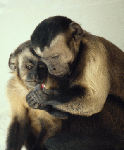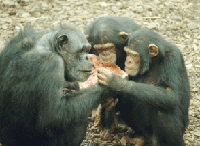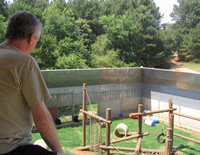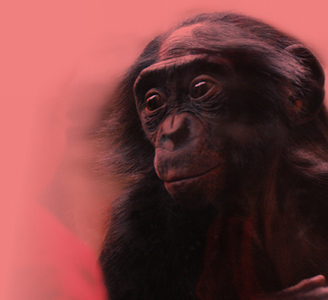Author
A Day in the Life of a Primatologist

Leading a team of around fifteen people (technicians, postdocs, graduate students, and undergraduates), I am never two days in a row at the same place.
Most of our research is done at the Field Station of the Yerkes Primate Center, even though we also work on bonobos in the Democratic Republic of the Congo and still have connections with elephant work in Thailand.
One or two days a week I drive to the Field Station, near Lawrenceville, which is about an hour outside of the city. It is a 117 acre piece of land on which we keep about two thousand primates, mostly rhesus monkeys. This station used to be in the middle of nowhere, but is now in the suburbs, separated from the neighborhood by a lake, a forest, and a high fence. The primates live in large groups in open-air compounds with lots of space and climbing structures. We work with three groups of chimpanzees that I have known for decades.
We discuss all of the developments, power struggles, and life-changing events. Peony's arthritis is acting up, Bjorn has a major gash from a fight, and Azalea is being weaned by her mom, and so on. A lot of the research here is observational. We stand on a tower with a keyboard attached to a palm pilot (or an iPhone nowadays) and type in the behavior we see, or we videotape social interactions to see how the apes combine hand gestures with vocalizations.

We also experiment with these chimps, but since we cannot control them (they are stronger than us) we are dependent on their willingness to be tested. Everything is on a volunteer basis. We have a special testing room into which we lure them by calling their names (we can even ask one chimp to fetch another, since they know each other's names). Testing with chimps is slow: On some days no one wants to work with us (such as when the weather is splendid) whereas on other days they all try to come into the testing rooms, making lots of noise and preventing us from the one-on-one testing we prefer. Our tasks have to do with cooperation, reciprocity, imitation, mirror self-recognition, altruism, and so on.
I have an office that overlooks one chimp compound. I have seen most of the adults grow up, so know them extremely well. They know me, too, of course, and never object to me being around, whereas strangers are received with mud balls against the window of my office, which they consider part of their territory. I watch the developments in the group, as there's always something going on, even on the laziest summer day.

On other days, I am at the Psychology Department on Emory campus, where I teach, see more students, and do the administration of data and money matters. The only primates I see on those days are human. In class, I show tons of pictures and videos of nonhuman primates since I believe students can't understand primate behavior without seeing it for themselves.
So, not all of my days are filled with hands-on primate work. I have watched monkeys and apes for literally thousands of hours, so only need to hear half a story or see a brief scene to know what's going on. I now leave the labor-intensive testing and observations mostly to others, but do want to be close to the scene and regularly see my primate friends.
Previous ⋅ Atlanta

